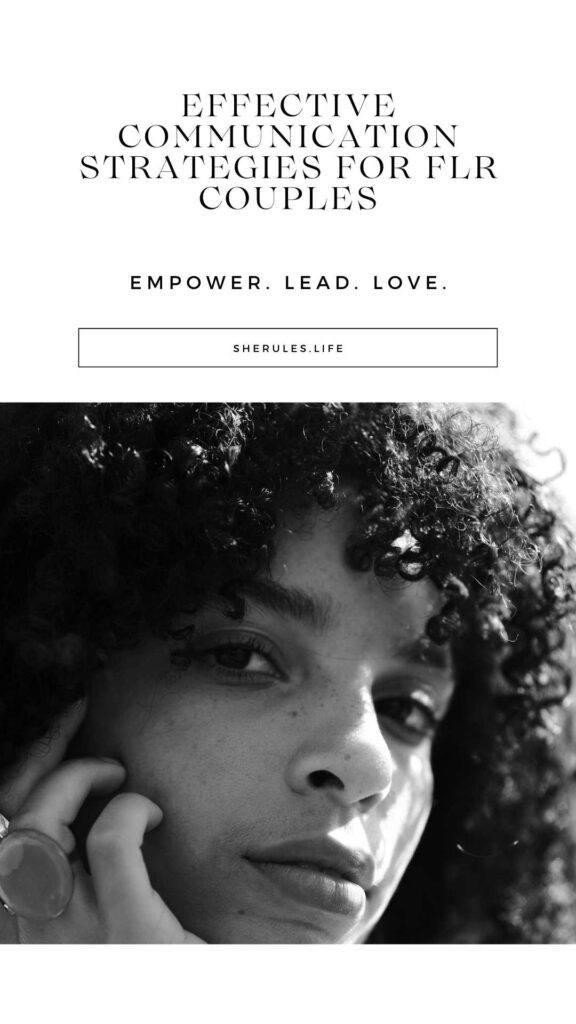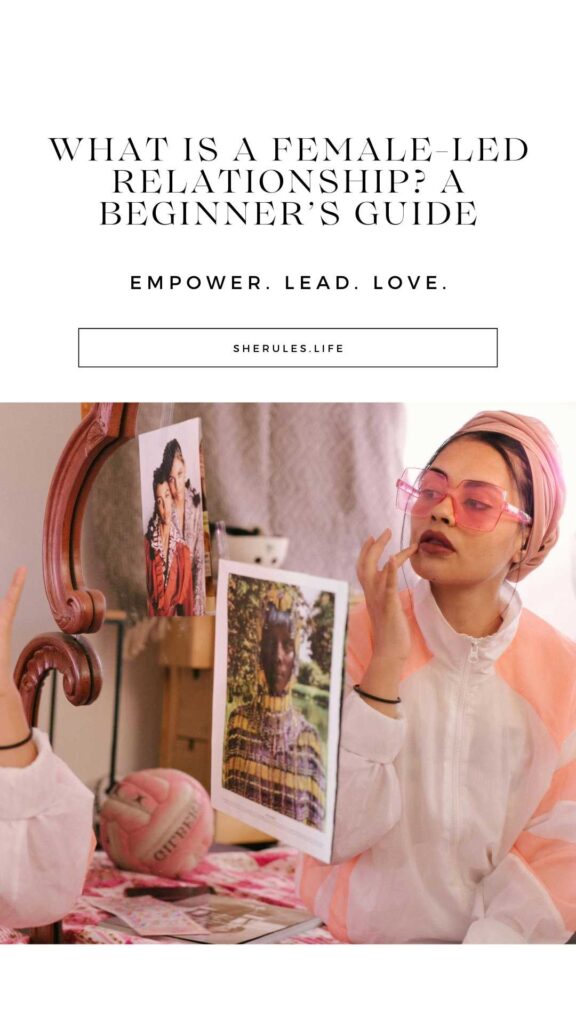
As we all know, communication is the backbone of any healthy relationship, but in FLRs, it takes on an even more significant role.
So, let’s explore some powerful strategies that can help you and your partner foster understanding, deepen your connection, and navigate the unique dynamics of an FLR with grace and mutual respect.
Active Listening- The Foundation of Understanding
Let’s start with a fundamental skill that’s often overlooked: active listening. In an FLR, it’s vital for both partners to feel heard and understood.
Active listening goes beyond simply hearing words; it’s about fully engaging with your partner’s message.
Active listening is a cornerstone of effective communication in FLRs. Here are some tips to enhance your active listening skills:
Give your full attention: Put away distractions like phones or tablets when your partner is speaking.
Show you’re listening: Use non-verbal cues like nodding, maintaining eye contact, and leaning in slightly.
Reflect and clarify: Paraphrase what you’ve heard to ensure you’ve understood correctly.
Avoid interrupting: Let your partner finish their thoughts before responding.
Ask open-ended questions: This shows interest and helps you gain a deeper understanding.
Remember, active listening isn’t just about gathering information. It’s about creating a safe space where both partners feel valued and respected.
In an FLR, this skill becomes even more crucial as it helps the leading partner make informed decisions and the supporting partner feel heard and appreciated.
Expressing Needs and Desires
In any relationship, but especially in an FLR, being able to express your needs and desires clearly is essential. This applies to both partners – the leading woman and the supporting man. Clear expression of needs and desires is crucial in a female-led relationship.
For the leading partner:
- Be clear and specific about your expectations
- Use “I” statements to express your feelings and needs
- Avoid assumptions – your partner can’t read your mind
For the supporting partner:
- Don’t be afraid to voice your needs
- Express your desires in a respectful manner
- Be open about your boundaries and limits
Remember, expressing needs isn’t about making demands. It’s about opening up a dialogue that allows both partners to understand each other better.
In an FLR, this open communication helps the leading partner make decisions that benefit both individuals and strengthens the relationship as a whole.
Navigating Disagreements: Healthy Conflict Resolution
Even in the most harmonious FLRs, disagreements are bound to arise. The key is not to avoid conflicts but to handle them in a healthy, constructive manner. Healthy conflict resolution is crucial for navigating disagreements in FLRs.
Here are some strategies for resolving conflicts in an FLR:
- Stay calm and respectful: Avoid raising your voice or using hurtful language.
- Focus on the issue, not the person: Address the problem, not your partner’s character.
- Use “I” statements: Express how you feel rather than blaming or accusing.
- Listen to understand, not to respond: Try to see things from your partner’s perspective.
- Look for compromise: Aim for solutions that consider both partners’ needs.
- Take breaks if needed: If emotions run high, it’s okay to pause and resume the discussion later.
In an FLR, the leading partner has the final say in decisions. However, this doesn’t mean ignoring the supporting partner’s input.
Healthy conflict resolution involves considering both perspectives and finding solutions that strengthen the relationship.
The Importance of Regular Check-ins
One of the most effective tools for maintaining strong communication in an FLR is the practice of regular check-ins.
These are dedicated times set aside for open, honest discussions about the relationship. Regular check-ins play a vital role in maintaining healthy communication in FLRs.
Here’s how to make the most of your check-ins:
- Schedule them regularly: Whether it’s weekly, bi-weekly, or monthly, consistency is key.
- Create a safe space: Ensure both partners feel comfortable sharing openly.
- Cover all aspects: Discuss emotional, practical, and intimate aspects of your relationship.
- Be honest: Use this time to address any concerns or issues before they become bigger problems.
- Celebrate successes: Acknowledge what’s going well in your relationship too.
- Set goals: Use this time to align on future plans and aspirations.
Regular check-ins provide a structured opportunity to address any issues, celebrate successes, and ensure both partners are on the same page.
They’re particularly crucial in FLRs, where clear communication about roles, expectations, and feelings is vital for the relationship’s success.
Non-verbal Communication in FLRs
While we often focus on verbal communication, non-verbal cues play a significant role in how we interact with our partners.
In FLRs, being attuned to these subtle signals can greatly enhance understanding and connection. Non-verbal communication plays a crucial role in female-led relationships.
Here are some aspects of non-verbal communication to be aware of:
- Body language: Posture, gestures, and facial expressions can convey a lot about how someone is feeling.
- Eye contact: Maintaining appropriate eye contact shows engagement and respect.
- Touch: Physical affection can communicate care and support.
- Tone of voice: The way something is said can be as important as what is said.
- Spatial distance: How close or far you stand from your partner can indicate comfort levels.
In an FLR, non-verbal cues can be particularly important. For example, the leading partner might use certain gestures to convey instructions or expectations, while the supporting partner might use non-verbal cues to show respect and submission.
Being aware of these non-verbal signals and ensuring they align with your verbal communication can help avoid misunderstandings and strengthen your connection.
Setting and Respecting Boundaries
Boundaries are essential in any relationship, but they take on special significance in FLRs. Clear, well-communicated boundaries ensure that both partners feel safe, respected, and comfortable in their roles. Setting and respecting boundaries is crucial in female-led relationships.
Here’s how to effectively set and respect boundaries in an FLR
For setting boundaries:
- Be clear and specific about your limits
- Explain the reasons behind your boundaries
- Be open to discussion and negotiation
For respecting boundaries:
- Listen actively when your partner expresses their limits
- Avoid pushing or testing established boundaries
- Regularly check in about comfort levels and adjust if needed
Remember, boundaries can evolve over time. What works at the beginning of your FLR journey might need adjustment as you grow together.
Regular, open discussions about boundaries ensure that both partners continue to feel safe and respected within the relationship dynamic.
Giving and Receiving Feedback
In an FLR, as in any relationship, growth and improvement come through honest feedback. However, giving and receiving feedback effectively is a skill that requires practice and sensitivity. Learning how to give and receive feedback is crucial in a female-led relationship.
Tips for giving feedback:
- Be specific and constructive
- Focus on behaviors, not personality traits
- Use “I” statements to express how their actions affect you
- Offer suggestions for improvement
- Balance negative feedback with positive reinforcement
Tips for receiving feedback:
- Listen without becoming defensive
- Ask for clarification if needed
- Thank your partner for their honesty
- Reflect on the feedback before responding
- Discuss actionable steps for improvement
In an FLR, feedback often flows from the leading partner to the supporting partner. However, it’s important to remember that feedback should be a two-way street. The supporting partner should also feel empowered to provide respectful feedback about the relationship dynamic.
Building Emotional Intelligence
Emotional intelligence (EQ) is a crucial skill in any relationship, but it becomes even more important in the context of an FLR.
EQ involves recognizing, understanding, and managing your own emotions, as well as being able to recognize and influence the emotions of others. Building emotional intelligence is key to better communication in FLRs.
Here are some ways to build emotional intelligence in your FLR:
- Practice self-awareness: Regularly check in with your own emotions and reactions.
- Develop empathy: Try to understand your partner’s perspective, even when it differs from yours.
- Manage your emotions: Learn techniques to stay calm and composed, especially during disagreements.
- Improve social skills: Work on your ability to communicate effectively in various situations.
- Practice active listening: This skill is crucial for understanding your partner’s emotional state.
In an FLR, the leading partner often needs to make decisions that affect both individuals. High emotional intelligence allows her to consider not just practical factors, but also the emotional impact of these decisions.
For the supporting partner, emotional intelligence helps in understanding and adapting to the leader’s needs and decisions.
The Role of Honesty and Transparency
Honesty and transparency form the bedrock of trust in any relationship, and they’re particularly crucial in FLRs.
When both partners commit to being open and truthful, it creates a safe environment where the relationship can flourish. Honesty and transparency play a vital role in FLR communication.
Here’s how to foster honesty and transparency in your FLR:
- Be truthful, even when it’s difficult
- Share your thoughts and feelings openly
- Avoid keeping secrets that could affect the relationship
- Be willing to have difficult conversations
- Admit mistakes and take responsibility for your actions
- Be open about your needs, desires, and expectations
In an FLR, honesty and transparency are essential for the leading partner to make informed decisions.
The supporting partner needs to feel safe sharing their true feelings and concerns, even if they might conflict with the leader’s desires.
This open communication allows for adjustments and compromises that strengthen the relationship.
Cultivating Patience and Understanding
Patience and understanding are virtues that can significantly enhance communication in an FLR. Both partners need to remember that they’re on a journey together, and that growth and adjustment take time.
For the leading partner:
- Be patient as your partner learns and adapts to their role
- Understand that mistakes will happen, and use them as learning opportunities
- Take time to explain your decisions and expectations clearly
For the supporting partner:
- Be patient with yourself as you learn to navigate your role
- Understand that your partner is also growing and learning
- Take time to process instructions or feedback before responding
Remember, an FLR is a unique dynamic that both partners are navigating together. Cultivating patience and understanding creates a supportive environment where both individuals can grow and thrive.
The Power of Appreciation and Acknowledgment
In the hustle and bustle of daily life, it’s easy to forget the power of a simple “thank you” or a word of appreciation.
In an FLR, regularly expressing gratitude and acknowledging each other’s efforts can significantly boost morale and strengthen your bond.
For the leading partner:
- Acknowledge your partner’s efforts in supporting you
- Express appreciation for their submission and trust
- Recognize improvements and progress
For the supporting partner:
- Show gratitude for your partner’s guidance and leadership
- Acknowledge the responsibilities they shoulder
- Express appreciation for the growth opportunities within the relationship
Remember, appreciation isn’t just about big gestures. It’s often the small, daily acknowledgments that make the biggest difference. A simple “I appreciate you” can go a long way in nurturing your FLR.
Navigating Public and Private Communication
FLRs often involve different communication styles in public versus private settings. It’s important for both partners to be on the same page about how they’ll interact in various situations.
In private:
- Be open and honest about your FLR dynamic
- Feel free to use terms of endearment or power exchange language if that’s part of your dynamic
- Discuss any issues or concerns openly
In public:
- Agree on how you’ll present your relationship to others
- Respect each other’s comfort levels with public displays of your dynamic
- Have subtle signals or code words to communicate discreetly if needed
Remember, your FLR is unique to you. There’s no one-size-fits-all approach to public versus private communication. The key is to discuss and agree on what works best for both of you.
Using Technology to Enhance Communication
In today’s digital age, technology can be a valuable tool for enhancing communication in your FLR. Here are some ways to leverage technology:
- Use messaging apps for quick check-ins throughout the day
- Set up shared calendars for scheduling and task management
- Use note-taking apps to keep track of rules, goals, or discussion points
- Try couples’ apps designed for improving communication and intimacy
- Use video calls when you can’t be physically together
While technology can be helpful, it’s important to set boundaries around its use. Agree on response times, appropriate times for contact, and when to prioritize face-to-face communication over digital methods.
The Importance of Self-Reflection
Effective communication in an FLR isn’t just about how you interact with your partner – it’s also about how you communicate with yourself. Regular self-reflection can help you understand your own needs, motivations, and areas for improvement.
Here are some self-reflection practices to consider:
- Journaling about your thoughts and feelings
- Meditating to increase self-awareness
- Regularly asking yourself what you need and want from the relationship
- Reflecting on your reactions and behaviors after interactions with your partner
- Seeking therapy or counseling for personal growth
By developing a better understanding of yourself, you’ll be better equipped to communicate effectively with your partner and navigate the unique dynamics of your FLR.
Celebrating Successes and Learning from Challenges
Finally, remember to celebrate your successes as a couple. Did you navigate a difficult conversation successfully? Reach a new level of understanding? Achieve a goal together? Take time to acknowledge and celebrate these milestones.
At the same time, view challenges as opportunities for growth. When communication breaks down or misunderstandings occur, resist the urge to place blame. Instead, approach these situations with curiosity and a willingness to learn. Ask yourselves:
- What can we learn from this situation?
- How can we handle similar situations better in the future?
- What does this challenge reveal about our needs or expectations?
By celebrating successes and learning from challenges, you create a positive cycle of growth and improvement in your FLR.
Conclusion
Effective communication is the lifeblood of any successful relationship, and it takes on even greater importance in the context of a Female Led Relationship.
Implementing these strategies – from active listening and expressing needs clearly, to setting boundaries and giving feedback – you can create a strong foundation of understanding and respect in your FLR.
Remember, every relationship is unique, and what works for one couple may not work for another. The key is to keep the lines of communication open, be willing to adapt and learn, and always approach your partner with love, respect, and understanding.
I hope these strategies prove helpful in your FLR journey. Remember, building strong communication skills takes time and practice, so be patient with yourselves and each other. Here’s to growing together in love, respect, and mutual understanding!
If you found this article helpful, please consider supporting my work. Your support means the world to me and helps me continue creating valuable content for the FLR community. You can make a donation or buy me a coffee at https://ko-fi.com/iamraima.
Every contribution, no matter how small, is deeply appreciated and keeps me motivated to bring you more insights into the world of Female Led Relationships. Thank you for your support!

